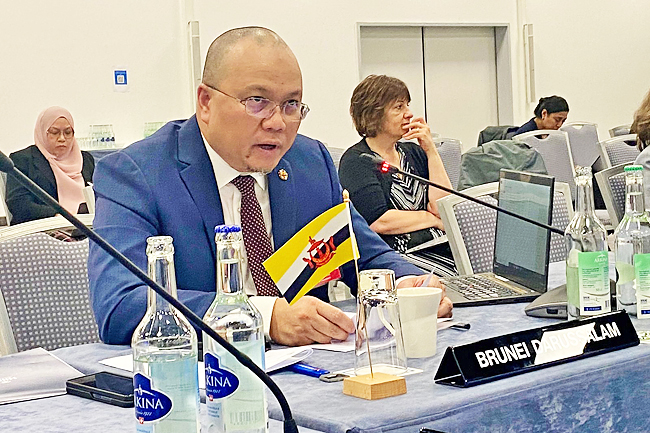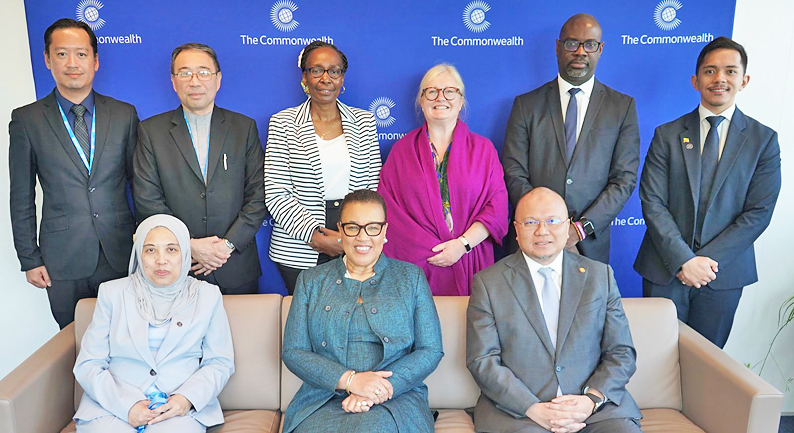James Kon
Brunei Darussalam has made several proposals to be included in the pandemic convention being drafted by Commonwealth countries, including creating a permanent multilateral mechanism to ensure effective and fair global response to pandemics with the need for closer cooperation between countries in terms of transparency, information exchange and manufacturing cost.
In addition, technology transfer and knowledge enhancement must become the norm during pandemics and response phases, through incentives and research funding.
The proposals were made by Minister of Health Dato Seri Setia Dr Haji Mohd Isham bin Haji Jaafar at the plenary session on ‘Efforts in strengthening prevention, preparedness and response to pandemics by investing in products production and local health technology’ under the 35th Commonwealth Health Ministers Meeting in Geneva, Switzerland recently.
The minister said the pandemic demonstrated the importance of having a strong and resilient healthcare system, which can only be achieved with fair and timely access, adding that, as a small nation with limited capacity, Brunei cannot be too dependent on global supply chains for access to medical response needs.
The meeting was attended by health ministers and senior officers from Commonwealth countries to discuss cooperation in achieving universal health coverage (UHC), with the theme ‘Getting Universal Health Coverage in the Commonwealth on Track for 2030’.
Permanent Representative of Brunei Darussalam to United Nations in Switzerland Dayangku Hajah Mazlizah binti Pengiran Haji Mahalee and Deputy Permanent Secretary (Professional) at the Ministry of Health Dr Ang Swee Hui also attended the meeting.


The meeting highlighted opportunities to review the progress on UHC as well sharing the challenges and priorities on related issues and efforts in strengthening preparedness in handling pandemics.
During the plenary session on ‘Basic healthcare as the main driver to achieve UHC’, the minister said Brunei prioritises UHC as the basic pillar in planning and implementation of the national healthcare system framework to provide high quality healthcare that is accessible to all.
The challenges include human resource shortages, ageing population, rising healthcare costs and increased burden due to non-communicable diseases (NCDs).
The meeting concluded with a joint statement emphasising unifying and integrating primary healthcare, mental health and digital healthcare technology as the main driver to achieving UHC includes harnessing innovative strategies and solutions, addressing the lack of human resources and the increasing mental health burden.
The ministers also agreed to enhance efforts on pandemic response, preparedness, and prevention and support efforts to strengthen global health architecture including through new international instruments of discussion and amendment of the International Health Regulations; to increase investment and collaboration in local and regional manufacturing capacity which are resilient to future pandemics; and to promote research and development.
The statement also reaffirmed the ministers’ determination to achieve the mandate and commitment of Commonwealth Heads of Government Meeting (CHOGM) by giving priority and investment, including accelerating progress in eliminating neglected tropical diseases, emphasising the importance of strengthening basic healthcare to ensure fair access to examination services and quality treatment for cervical cancer, encouraging coordination of various sectors to deal with malnutrition, NCDs including mental disease, importance of physical activities, sports and nutrition.
The ministers acknowledged the importance of a multi-sector approach and various disciplines to overcome gaps and advance coordination to achieve UHC by 2030.
Dato Seri Setia Dr Haji Mohd Isham also paid a courtesy call on Commonwealth Secretary-General Patricia Scotland to discuss health-related matters among Commonwealth countries.
Brunei Darussalam has also been given the honour of chairing the Commonwealth Advisory Committee on Health (CACH), which provides advice and guidance to Commonwealth health ministers and Commonwealth Secretariat on public health issues for the term 2023 to 2024.




